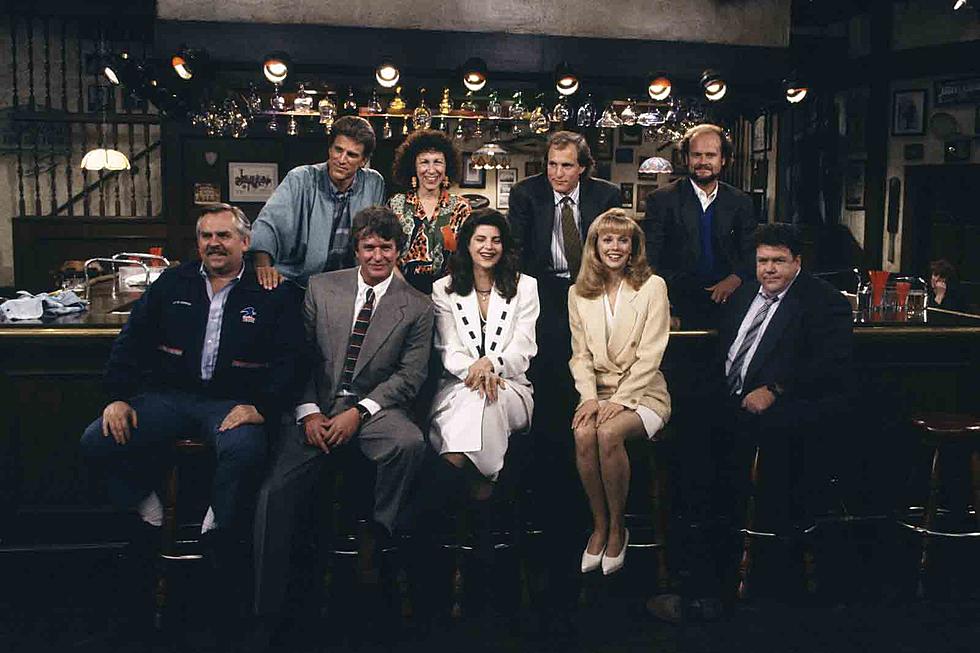
30 Years Ago: The ‘Cheers’ Gang Bows Out
In the second act of the Cheers finale, “One for the Road,” Sam Malone lashes out. Addressing the ever-present gaggle of barflies, employees and collected denizens of the former Red Sox pitcher’s sports bar landing pad, Sam, defiant in the face of his friends’ understandable skepticism of his six-year-later reunion with former on-and-off love interest Diane Chambers, really lets the regulars have it.
“I need more than this!” Ted Danson’s Sam states coldly to the people he’s spent every day of 11 seasons with as he and Shelley Long’s Diane prepare to leave for her new home turf of Hollywood. “You should need more than this! I am not your mother. This is not your home.” It’s a bit of tough love that struck right at the heart of Cheers’ cozy appeal.
Cheers’ famous theme song touted the Boston bar as the place where “Everybody knows your name / And they’re always glad you came.” And throughout its monumentally successful and beloved 11-season run, Cheers the show and Cheers the bar represented, for a whole lot of people, exactly the sort of nonjudgmental, unerringly funny and sweetly silly destination America needed. By the time Cheers’ supersized finale “One for the Road” aired on May 20, 1993, the series wasn’t perhaps drawing the same mammoth ratings it scored in its heyday. But the 70-minute last call was an unprecedented success, with 42 million households tuning in to see how their favorite hangout show would finally say goodbye.
In the end, there was truly only one way Cheers could end, and it’s seeded right into the series’ very first shot. Sam Malone, the inveterate womanizer, former hometown hero pro athlete and recovering alcoholic emerges from the back room of Cheers, the single asset he’s retained from his time in the Boston sports spotlight. Sam, still with a ballplayer’s rangy grace, adjusts a hanging picture just so as he prepares for the first customer of the day.
Throughout Cheers’ 11 seasons, we’d see Sam Malone go through the wringer, all veiled by the series’ light and increasingly chummy comic atmosphere. He’d fall for the bookish academic and peerless snob Diane when she was abandoned by her faithless fiance at Cheers. Their tumultuous affair and breakups would leave them both shattered, as Diane wound up in a mental institution and Sam fell spectacularly off the wagon. An abortive reunion saw aspiring writer Diane leave Cheers to write her long-gestating novel, her planned six-month sabbatical turning into a six-year absence where a chastened Sam pulled himself together enough to regain control of the beloved bar he’d sold to a heartless corporation.
Kirstie Alley's Rebecca Howe, the ambitious yuppie installed to run Cheers, was initially presented as a replacement love interest, before Alley’s gifts at physical comedy and comically thwarted dreams found her becoming just another of Cheers’ also-ran lovable losers. Taking her place among the likes of George Wendt’s perennial barfly Norm, John Ratzenberger’s loquacious mailman Cliff, Rhea Perlman’s wisecracking, forever-pregnant barmaid Carla and Diane’s castoff former lover and shrink Frasier Crane (Kelsey Grammer), Rebecca, despite some ill-advised rekindling of the Sam-and-Rebecca romance over the years, became just one more example of how the descent into Cheers’ homey, boozy environs could turn a quick drink into a lifetime of amusingly lowered expectations.
And that was Cheers’ winning formula. We wanted to sit down and be invited into the circle of friendly banter, hijinks and comforting predictability. We didn’t want the show to change, just as the Cheers gang was aghast at the prospect of Sam yanking himself up by the roots and making a new life. (Later seasons decided to have Sam confront his aging obsession and supposed sex addiction to awkward effect.) Cheers leaving the air was unsettling for an audience who’d grown so comfortable knowing it would always be there. “I’m sorry everyone,” Diane says to the gang in the wake of the departed Sam’s outburst. “This is the best for Sam, believe me.”
Long’s return for the finale was as shocking as it was inevitable for such an event. “Sam and Diane” became synonymous with the sitcom “Will they or won’t they?” TV trope during her five seasons on the show; Long’s somewhat acrimonious exit forced Cheers to find its feet all over again. Re-introduced by the broadcast of her typically interminable acceptance speech on the bar’s TV at the Cable Ace Awards for a TV movie she wrote (it was 1993), at first, it seems like Long’s will literally phone in her farewell, as she and Sam share a strained phone call. (And Long sports a truly baffling blonde wig.)
Soon, however, the two old flames are one-upping each other with tales of their fulfilling lives, their mutual defensive lies sending them onto the inevitable collision course back at Cheers. Meanwhile, “One for the Road” manages to feel both too long and rushed as the finale attempts to sew up the ensemble’s various storylines in a perfunctory fashion.
Watch the Final Scene From 'Cheers'
Woody Harrelson’s delightfully dim barkeep Woody is now a Boston city councilor and gets perpetually unemployed accountant Norm a city job. Cliff bribes his way into a minor Post Office promotion. Carla and Frasier bond hilariously over their shared horror at the prospect of Diane being back in their lives. Rebecca, in the lukewarm throes of a love story with guesting Tom Berenger’s plumber (the impeccably named Don Santry), gets the most to do, Alley’s exquisite gift for turning misery into comedy making Rebecca’s woozy indecision a fittingly funny goodbye. (“I married a plumber!” the weeping Rebecca confides to the gang upon her return from city hall, knowingly adding, “And the horrible part of it is, he’s too good for me!”)
Naturally, Cheers doesn’t end with the woefully mismatched but passionately loving couple that is Sam and Diane running off together after all this time. A hackneyed joke sees each imagining the flight crew of their California-bound plane echoing both of their inner doubts about so impetuously diving back into their once all-consuming, undeniably toxic relationship, with a convenient electrical problem ushering Sam back into Logan airport and back to Cheers.
After a well-deserved fake-out rejection by his friends, the gang breaks into Sam’s Cuban cigar stash to offer up the barely disguised sentimental goodbye the bereft home audience needed. In the sweet, smoky banter, Cliff offers up the piece of mailman’s wisdom that the true secret to happiness is comfortable shoes, a cagey metaphor for the sort of undemanding pleasures Cheers had settled into in its time on the air.
In the end, it’s back to Sam and his number one customer Norm to close things out. The others gone, we get one last nimble bit of Norm Peterson wordplay:
Norm: You wanna know what I love?
Sam: Beer Norm?
Norm, pulling up a stool in the empty bar: Yeah, I’ll have a quick one.
As Norm downs the last of his innumerable Cheers beers, he confesses that he knew all along that Sam would never leave. Asked why, the Cheers regular states in one last bit of barfly wisdom, “You can never be unfaithful to your one true love. You always come back to her.” Asked again, Norm only responds, “Think about it, Sam,” before blearily heading back to his long-suffering and ever-unseen wife Vera.
Left alone to ruminate, Sam Malone finally chuckles in recognition. Addressing his empty bar, he says finally, “Well, I tell ya. I’m the luckiest son of a bitch on earth.” Then he walks off into the darkness of the back room, stopping only to straighten a picture of Geronimo (totem of Nicholas Colasanto’s long-departed bartender Coach) before disappearing into the recesses of the one place he feels truly at home. (And restating the ruefully prophetic pun that is Sam’s name.)
“One for the Road” isn’t perfect. Long’s Diane is a necessary callback, but the actress feels only partly present. The attenuated run time leaves too much slack here and there, and the forced sentiment of the gang’s cigar-puffing goodbye comes off a bit manufactured for the occasion. But for a show whose pleasantly silly demeanor was built around a core of surprising somberness, Cheers’ finale finds just the right note to leave on. As Sam prepares to close up, a single figure knocks at the door, only for Sam to announce, “Sorry, we’re closed.” Cheers the show was over, but it’s appropriately comforting that Sam Malone will open the place up each morning.

